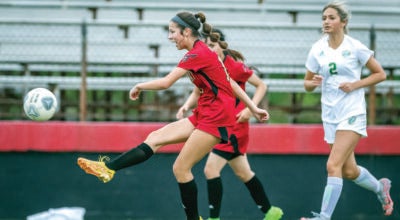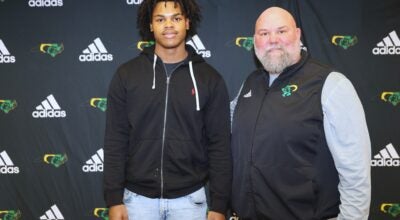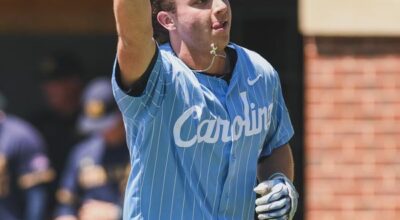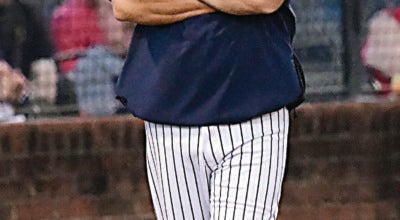Sports Legends: Local resident was coached by Knight
Published 12:00 am Thursday, May 28, 2020
By Mike London
mike.london@salisburypost.com
GRANITE QUARRY — Rowan County resident Denny Shantz is a brilliant guy, quite literally a rocket scientist for several years for Uncle Sam.
Now 76, Shantz also is a former point guard, a three-year starter at Army, during the golden years for Black Knights basketball. Shantz played a key role in six NIT victories and two third-place finishes in the mid-1960s, and in those days, when the NCAA March Madness field was much smaller, the NIT was quite prestigious. Conference runners-up and 20-win independents swaggered into Madison Square Garden for furious battles in the NIT.
“Everyone was more talented than we were and taller than we were,” Shantz said. “But no one was in better shape than us, and we never gave up. We were a surprise team for two seasons.”
There was a stretch in 1963-64 season when Shantz played against legends of the game — Miami’s Rick Barry, Princeton’s Bill Bradley and Syracuse’s Dave Bing — back-to-back-to-back. Army was no slouch. It won two out of three.
“We played against Bradley’s Princeton team a lot, but that was the only time we ever beat them — in a holiday tournament down in Miami,” Shantz said. “Barry — you remember the underhand free throws. Bing was the toughest guy I ever had to guard. He was 6-foot-3 and every bit as quick and fast as I was at 5-foot-10. That was a dilemma.”
Shantz played for coaches at Army who walked the fine line between genius and madness. Bobby Knight, who Shantz got along with splendidly, was a calming influence in those days compared to Tates Locke. Shantz has some stories. He’s modest and doesn’t go out of his way to shout about what he did back in the day, but if you ask, he’ll tell you the truth.
If you’re wondering how a Pennsylvania native and former West Point athlete wound up in Rowan County, Shantz’s daughter, Andrea, and husband, West Rowan graduate Stephen Bullock, are Wake Forest graduates who raised their family here. Their daughters, Katie and Laura, are college students now at Furman and Davidson, respectively. Before that, they were athletes for Salisbury High, with Katie shining brightest in soccer and Laura in volleyball.
Shantz’s story starts in a small town. He was the best athlete they’d ever had at Plymouth Whitemarsh High, about 10 miles west of Philly. He scored 1,298 points in three seasons for the basketball team. He was a good baseball player, as well, but he threw his arm out in Little League, basically pitching every game.
“I did average 25 or 26 points in basketball my junior and senior years because I could shoot and I could drive,” Shantz said. “It wasn’t a big school and we didn’t have great teams when I was there. It was a different era. Our big guy was 6-foot-3. The big men we played against usually were 6-foot-5.”
Shantz was a stellar student. He graduated in 1961. His basketball heroes were guards Bob Cousy and Jerry West. His dream was Princeton, where he would have gotten to play with Bradley. Bradley was a very good NBA player, but he was such an amazing college player that he was MVP of the 1965 Final Four — while playing for the third-place team. He scored 58 points in one game.
Shantz actually had accepted a scholarship offer from Princeton, but his father’s dream for his son was Army. Army is where he went.
“West Point wasn’t where I wanted to be, but I made the most of it, and I can’t complain about how it all turned out,” Shantz said.
George Hunter was Army’s head coach and was the guy who had come to Shantz’s high school games. Locke was the freshman coach, and the freshman coach at Army doubled as the varsity assistant. College freshmen — known as yearlings or plebes at Army — competed on freshmen teams in that era.
“Coach Locke was a guy who wanted to see you go flying into the stands,” Shantz said. “I didn’t mind flying into the stands if I had a chance to get the ball, but if I didn’t have a chance, that wasn’t for me. I wasn’t going to be flying into the stands just to be flying into the stands. So Coach Locke and I never really got along.”
As a sophomore, Shantz played for Hunter. That was actually his best college scoring season, 9.6 points per game, but the team didn’t win often.
Locke replaced Hunter at the helm for the 1963-64 season. Hired as the new freshman coach (and varsity assistant) was Knight, who had been a reserve on Ohio State’s 1960 national championship team (that team had John Havlicek and Jerry Lucas) and had been coaching the jayvee basketball team at Cuyahoga Falls High in Ohio.
Shantz found an ally in Knight, who served as a buffer between Shantz and his volatile head coach.
“Coach Locke didn’t want me to shoot at all, but Coach Knight kind of made sure I played because I was the only ball-handler that we had,” Shantz said. “This was Bobby Knight before he had the shtick. He was just a young basketball coach then and we became friends. But, even then, I could tell he had a brilliant basketball mind. He knew players. He knew people.”
Shantz met his future wife (Dotty) while he was playing for Army. They’ve been married almost 55 years.
“She was dating one of my friends when I met her,” Shantz said sheepishly. “Coach Locke did not want our girlfriends coming to the games because it might distract us, so she would have to come to the games incognito. She couldn’t even say hello to me at the games, but I’d see her afterward.”
That 1963-64 Army team was the best one the school had ever had. The competition was solid. The ACC and SEC hadn’t integrated, but most of the teams in the East, Midwest and West had outstanding black players by that point.
The key addition for Army in 1963-64 was a a sturdy, 6-foot-6, 225-pound sophomore named Mike Silliman, who would make All-America teams. Silliman would captain the USA’s gold medal-winning Olympic team in 1968 and would have his jersey retired by Army.
“He was a left-handed big who could play and he could really score,” Shantz said. “My job was to make sure the ball got to Mike.”
One of the highlights for Shantz that season was going to Boston College — his hero, Cousy, was the coach — and whipping the Eagles. Havlicek, one of the Boston Celtics’ stars, dropped by the gym and Shantz had a chance to spend some time with him.
“A great guy,” Shantz said.
Shantz’s scoring dropped to 6.5 points per game that year, but he was pleased with the trade-off — a 19-7 record. Army finished the year on a winning streak and was invited to the NIT.
Army won a thriller against St. Bonaventure — the first postseason victory in program history — and then had an overtime triumph against Duquesne. Army lost to the Bradley Braves, the eventual NIT champs, in the semifinals. Bradley had two future pros, including Levern “Jelly” Tart, who would become a perennial all-star in the early days of the ABA.
In the third-place game, Army pulled it out, 60-59, against a New York University (NYU) team led by All-American Barry Kramer and Happy Hairston, a Winston-Salem native who would go on to a 13-year NBA career.
The 1964-65 season, Shantz’s senior year, was his most memorable. Locke was still on his case, but Knight still had his back. Once again, his job was press-breaker, offense-director and passer. He averaged 7.0 points a game.
Army started slowly, but then it picked up steam. Silliman averaged 18.2 points and 11.2 rebounds, while Jon Ritch, a 6-foot-7 Rhodes Scholar, averaged 15.4 points.
A great deal was happening in the world beyond the basketball arenas in March, 1965, as Shantz’s hoops career and days in West Point wound down. Army had a terrific season (21-8), another school record for victories, another trip to the NIT.
On March 7, 1965, about 600 marchers headed southeast out of Selma, Ala., on U.S. Highway 80, launching a pivotal chapter in the civil rights struggle.
On March 13, Shantz and his Army teammates were playing the St. Louis Billikens in the first round of the NIT. It was a game that would be the finest of Shantz’s college career. It was scheduled to be his first game on national TV, but the networks cut away from broadcasting the NIT for reports on the real-world events that were taking place in Alabama.
Shantz scored 21 points, mostly on drives, and took over the game late in a 70-66 victory. He got a few sentences in Sports Illustrated for that effort.
“I’d bitten my tongue for a long time because Coach Locke didn’t want me to look to score, but I knew I could score,” Shantz said. “That game, I knew it could be my last one, and I didn’t hold back. I wasn’t a Sports Illustrated kind of player, but I did have a good game.”
Army wasn’t done, edging Western Kentucky in the semifinals. That was the season Western Kentucky integrated, and one of its two black players was Clem Haskins, who would become an All-American and a first-round NBA draft pick. Footage of that game is available on YouTube. You can get an idea what kind of hustle and ball-handling Shantz brought to the floor. He makes a long one from the top of the circle that would be a 3-pointer in today’s game.
Army lost to St. John’s, the eventual champ, in the semifinals. St. John’s coach Joe Lapchick was one of the coaches Shantz most respected.
“He was old school, a real gentleman,” Shantz said.
Once again, Army took the NIT’s third-place game against NYU after losing to the eventual champion.
On March 8, 1965, one day after the first Selma march, the first 3,500 U.S. combat troops (Marines) arrived in South Vietnam. Prior to that landmark day, the U.S. had committed only aid and advisors.
That led to an important decision for Shantz, who had graduation looming. The war was certain to expand. There were brighter futures than being a second lieutenant headed to Vietnam.
“The Air Force needed officers, and my class was offered an Air Force option,” Shantz said. “I wasn’t one of those guys who had the goal of being a general, so I took it. If you wanted to be a general, you stayed with the Army and went to the Rangers. Some guys I knew were gung-ho about it.”
Shantz’s class of 1965 started out with 736 members. There were 596 who made it to graduation day on June 9. A handful went to the Marines and a few even ended up with the Navy. Shantz, who was getting married 10 days after graduation, was one of the 59 who chose to serve in the Air Force.
By 1968, there were a half-million American ground troops in Vietnam. A lot of second lieutenants were casualties.
Shantz had a four-year service commitment to fulfill and was assigned to Edwards Air Force Base in California. The Air Force sent him to graduate school for his masters in mechanical engineering and paid for it. The trade-off was he owed Uncle Sam an additional four years. He was assigned to a rocket jet propulsion lab for much of his service time and later was assigned to the ROTC program at Washburn University in Topeka, Kansas.
After that, it was on to civilian life.
He’s attended a number of reunions of players and coaches from the Army days. The odds were against him for a while, as far as making it to reunions. He survived open-heart surgery 20 years ago.
Locke moved on from Army to Miami (Ohio) after those two stellar seasons at West Point. ACC fans will remember Locke from his days at Clemson, his next stop after Miami.
Knight was named as Army’s 24-year old head coach when Locke departed. He would make red sweaters famous and chair-throwing almost respectable. The first of his 902 wins came when Army beat Worcester Tech on Dec. 8, 1965. He took Army back to the NIT (the third season in a row) in March, 1966. His final coaching record, including three national championships at Indiana, was 902-371.
Knight said often that Silliman was the best player he ever coached. Silliman died of a heart attack in 2000 when he was 56.
Mike Krzyzewski took over as Knight’s point guard for Army’s 1967-68 season. As Duke’s coach, his victory total has surpassed even his mentor’s and continues to swell.
Shantz and Knight were still on amiable terms the last time he saw him, although in retirement, Knight enjoys solitude more than gatherings. Much of his time is spent fishing in Montana.
“There was a reunion/banquet in Pinehurst (in 2015) to celebrate the 50th anniversary of Coach Knight’s first college win,” Shantz said. “I wasn’t that comfortable with Coach Knight’s speech because it was in mixed company and he used the same sort of language he would use in the locker room. Coach K also spoke. He thanked everyone that could have been thanked and was a gentleman.”
Shantz is very proud of his daughter, who is a counselor. He dotes on his granddaughters and is thrilled with their academic success.
“I do feel blessed,” Shantz said. “It’s been a very blessed life.”





